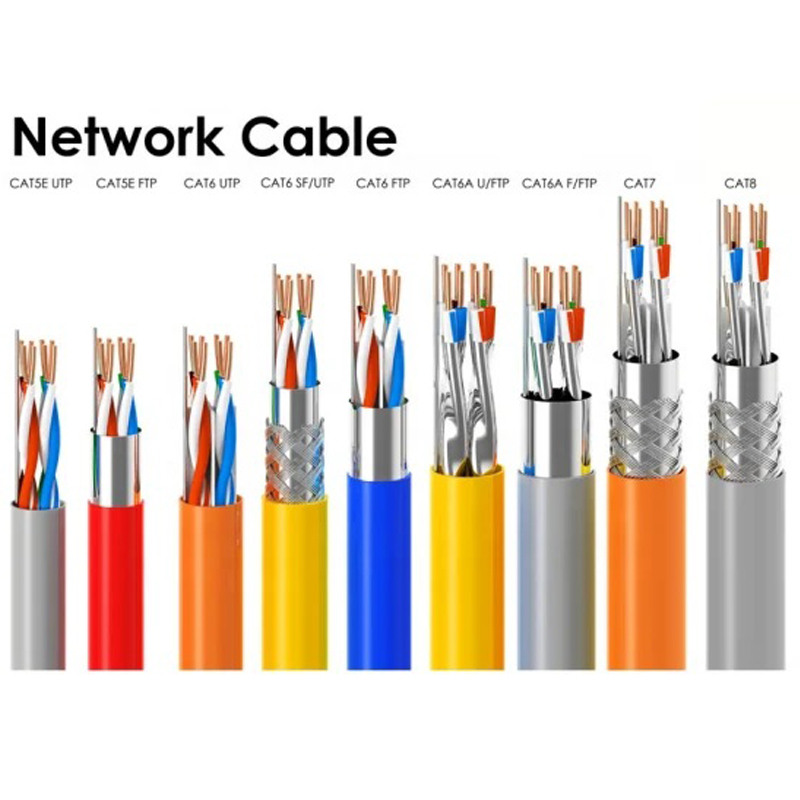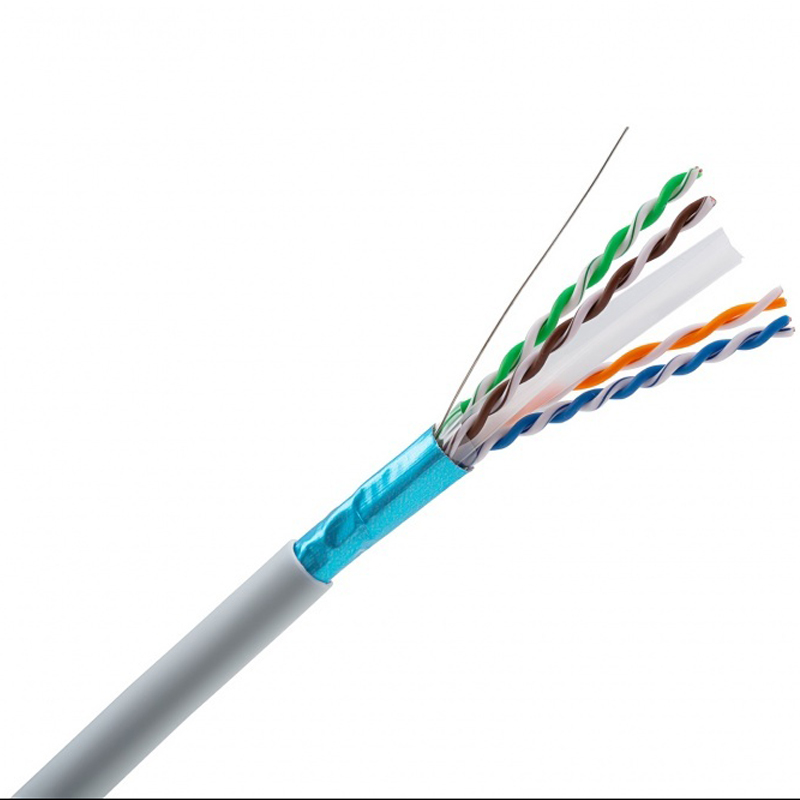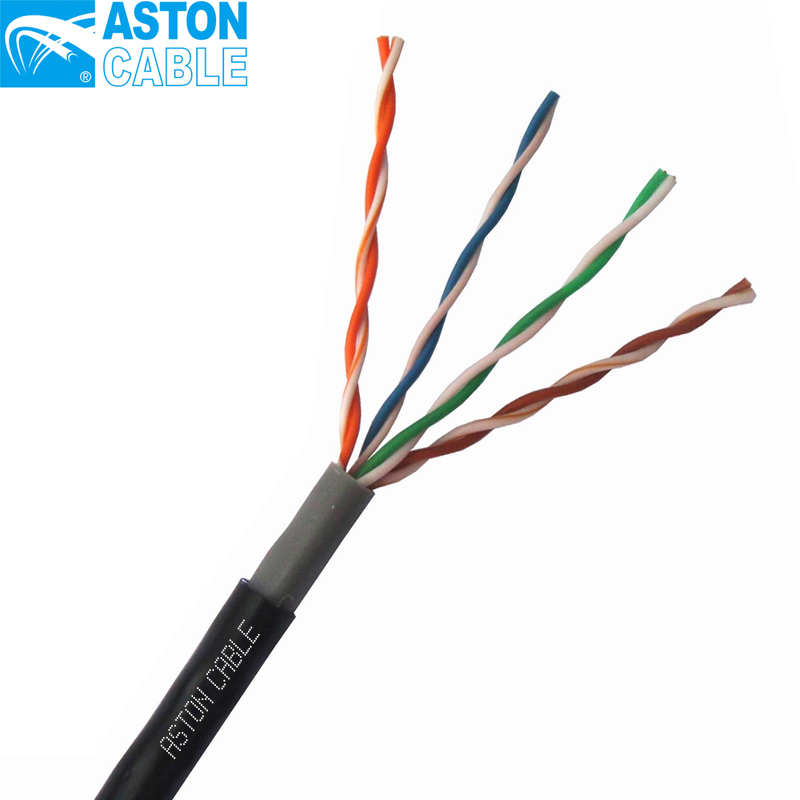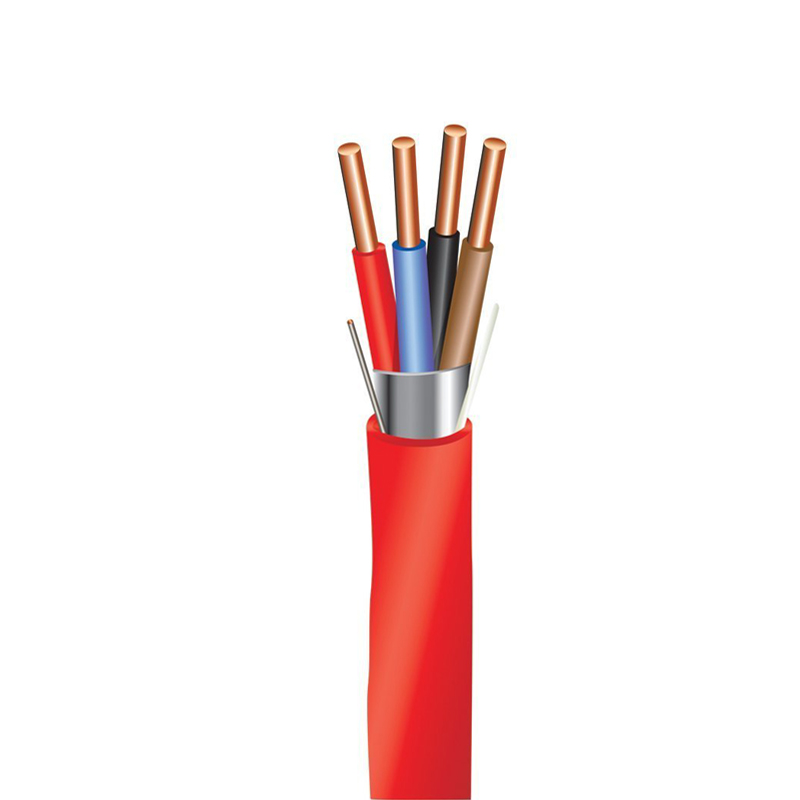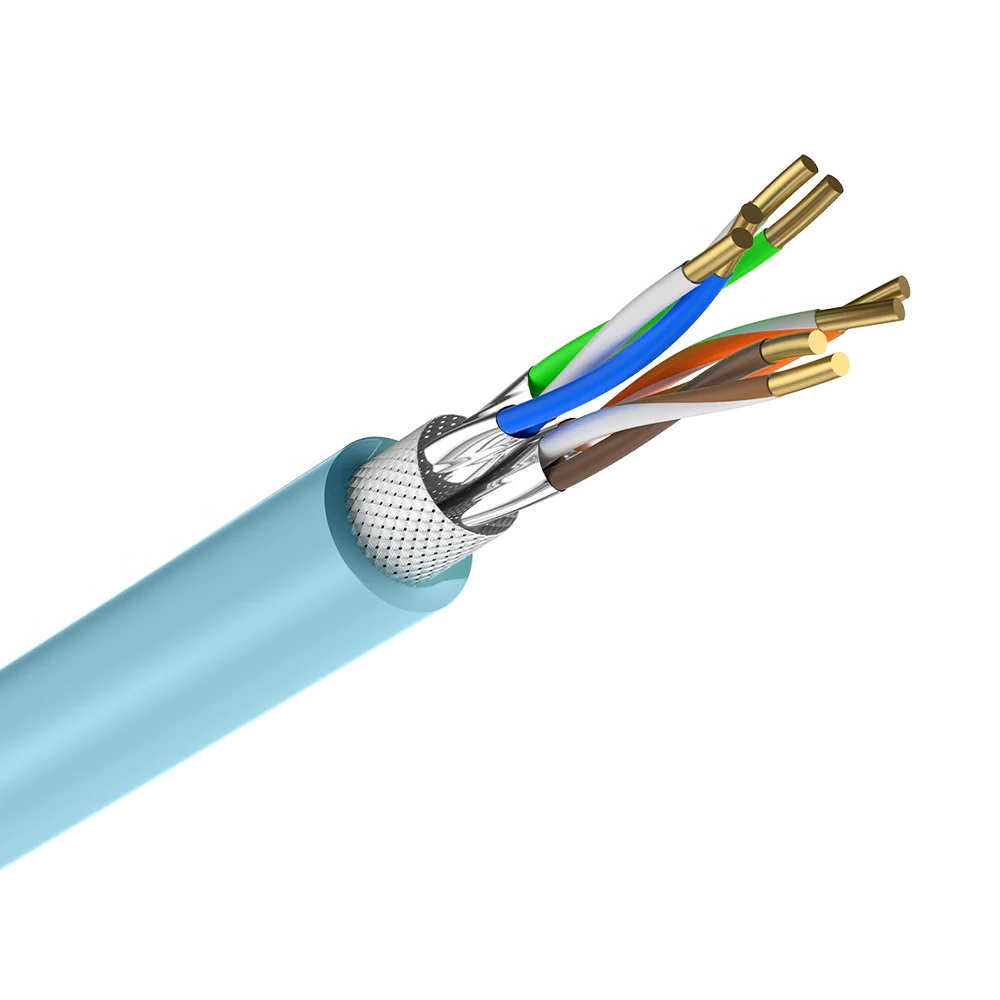| Product Name | LAN CABLE CAT6 |
|---|---|
| Jackets | PVC, LSZH, PE |
| Color | Customized |
| Conductor | 23AWG |
| Material | Bare Copper |
| Logo | OEM |
| Industrial Use | Network data |
| Origin | Hangzhou, Zhejiang |
Common Product Specifications
| Conductor | Bare Copper Solid or Stranded Flexible section in 23AWG |
|---|---|
| Core | 4Pairs stranded conductor |
| Insulation | PE Retardant meet the requirement of IEC |
| Outer Jacket | PVC, PE or LSZH Flame Retardant meet the requirement of IEC |
| Shielding | Aluminum/Polyester, Foil 110% Coverage |
| Drain Wire | CCA/Bare Copper Solid or Stranded |
Product Manufacturing Process
The manufacturing process of CAT6 cables involves several precise and quality-controlled steps. Firstly, high-purity copper or CCA is drawn into 23AWG strands. These conductors are then insulated with high-quality polyethylene (PE) or flame-retardant PVC/LSZH. The insulated conductors are twisted into pairs to reduce electromagnetic interference (EMI). Shielded cables undergo an additional step where aluminum foil is wrapped around the twisted pairs. The cable is then jacketed with PVC, PE, or LSZH, depending on the application needs. Finally, the cables undergo rigorous testing, such as the Fluke test, to ensure compliance with international standards like ISO9001, ISO14001, RoHS, CE, and IEC. Authoritative research highlights the critical nature of precise twisting and shielding in maintaining the high-speed data transfer and EMI resistance of CAT6 cables.
Product Application Scenarios
CAT6 cables are widely used in various network scenarios due to their high-speed data transfer capabilities and EMI resistance. In office environments, they connect computers to switches and routers, ensuring reliable and fast internet access. They're also used in backbone infrastructure to link main distribution frames to networking equipment in different building sections. In residential settings, CAT6 cables are ideal for high-speed home networks, supporting streaming, gaming, and multiple device connections. Research indicates that using CAT6 cables in high-interference zones like data centers or industrial areas can significantly improve network performance and reliability. Thus, CAT6 cables are essential for both commercial and residential networking solutions.
Product After-Sales Service
- 1-year warranty on all CAT6 cables
- Technical support via phone, email, and chat
- Replacement or refund policy for defective products
- Dedicated customer service team
Product Transportation
Our CAT6 cables are packaged for secure international shipping. Typically, we use standard export packaging. Delivery can be arranged via sea, air, or express courier, depending on customer needs. The delivery port is Ningbo, with an annual supply ability of 25,000KM. Please contact us for detailed shipping arrangements and costs.
Product Advantages
- High quality 23AWG copper or CCA conductor
- Various jacket materials: PVC, LSZH, PE
- Fluke test passed
- Shielded (F/UTP) for better EMI resistance
- Customizable length and color
Product FAQ
-
Q: What is the wholesale cat6 cable price?
A: The wholesale CAT6 cable price varies depending on length, shielding, and order quantity. Contact us for a detailed quote.
-
Q: What are the benefits of using shielded CAT6 cables?
A: Shielded CAT6 cables provide better EMI resistance, ensuring reliable data transmission in high-interference environments.
-
Q: Can I customize the cable length and color?
A: Yes, we offer customization options for cable length and color to meet your specific needs.
-
Q: Are your CAT6 cables RoHS compliant?
A: Yes, our CAT6 cables are RoHS compliant, ensuring they are free from hazardous materials.
-
Q: What is the MOQ for wholesale orders?
A: The minimum order quantity (MOQ) for wholesale CAT6 cables is 200 rolls.
-
Q: What types of jackets are available for CAT6 cables?
A: We offer CAT6 cables with PVC, LSZH, and PE jackets, catering to different installation needs.
-
Q: How do CAT6 cables compare to CAT5e cables?
A: CAT6 cables support higher frequencies (250 MHz) and faster speeds (up to 10GBASE-T), compared to CAT5e cables (100 MHz and 1GBASE-T).
-
Q: What testing do your CAT6 cables undergo?
A: Our CAT6 cables undergo rigorous testing, including the Fluke test, to ensure they meet international standards.
-
Q: What are the payment terms for wholesale orders?
A: Payment terms for wholesale orders are negotiable. Please contact our sales team for details.
-
Q: How fast can I receive my order?
A: Delivery times depend on order size and shipping method. Contact us for an estimated delivery time based on your order.
Product Hot Topics
-
What Factors Influence Wholesale CAT6 Cable Price?
Wholesale CAT6 cable prices vary based on multiple factors, including length, shielding, and brand. Generally, shorter cables are cheaper, and unshielded cables cost less than shielded ones. High-quality brands may charge more due to their reliability. Special features like plenum-rated jackets or snagless designs can also impact the price. For bulk purchases, prices are typically more favorable. Ultimately, choosing the right CAT6 cable depends on the specific needs of your network setup.
-
Best Practices for Installing CAT6 Cables in Office Environments
When installing CAT6 cables in office environments, it's essential to consider EMI and cable length. Shielded CAT6 cables (F/UTP) are recommended for high-interference areas to ensure data integrity. The cable runs should not exceed 100 meters to maintain optimal performance. Color coding can help organize complex network setups, making troubleshooting easier. Proper installation techniques, such as avoiding sharp bends and securing cables, will enhance longevity and reliability. Consulting with a professional network installer can ensure that the setup meets both performance and compliance standards.
-
Why Choose Shielded CAT6 Cables?
Shielded CAT6 cables (F/UTP) provide enhanced protection against electromagnetic interference (EMI), which can significantly improve data transmission reliability in high-interference environments. The aluminum foil shielding wrapped around the twisted pairs reduces crosstalk and external noise, making them ideal for industrial settings, data centers, and large office spaces. Although they may be slightly more expensive than unshielded options, the investment in shielded CAT6 cables can result in better performance and reduced network downtime, making them a worthwhile choice for critical applications.
-
Comparing CAT5e and CAT6: Which One to Choose?
Both CAT5e and CAT6 cables are widely used in network installations, but they serve different needs. CAT5e cables, supporting up to 1GBASE-T and 100 MHz, are often sufficient for most home and small office setups. However, CAT6 cables, with support for up to 10GBASE-T and 250 MHz, are better suited for environments requiring higher data transfer speeds and reduced interference. While CAT6 cables are generally more expensive, the enhanced performance and future-proofing they offer make them a better choice for demanding applications and a worthwhile consideration for new installations.
-
Understanding the Importance of Plenum-Rated CAT6 Cables
Plenum-rated CAT6 cables are designed with a flame-retardant jacket, making them suitable for installation in plenum spaces where air circulation occurs, such as between ceilings and floors. These cables meet stringent fire safety standards, reducing the risk of fire propagation and toxic smoke release. Although they are more expensive than non-plenum cables, their use is often mandated by building codes in commercial settings. Investing in plenum-rated CAT6 cables ensures compliance with safety regulations and provides peace of mind in terms of fire safety, especially in large office buildings and public spaces.
-
Optimizing Home Networks with CAT6 Cables
For home networks, CAT6 cables offer significant advantages over older cable types like CAT5e, especially as internet speeds continue to increase. With support for Gigabit and even 10-Gigabit Ethernet, CAT6 cables ensure smooth streaming, gaming, and data transfers. They also provide additional headroom for future upgrades, making them a smart investment for new home networking installations. Shielded CAT6 cables can be particularly beneficial in homes with many electronic devices, reducing the impact of EMI and ensuring stable connections for all networked devices.
-
Efficient Cable Management for Large-Scale Installations
Large-scale network installations, such as in data centers or corporate offices, require efficient cable management to maintain performance and ease of maintenance. Using CAT6 cables with color-coded jackets can help organize and identify connections. Employing cable trays, racks, and ties ensures that cables are neatly routed and secured, reducing the risk of damage and tangling. Regular maintenance and documentation of cable layouts are crucial for troubleshooting and future upgrades. Proper cable management not only enhances the network's reliability but also extends the lifespan of the cables and connected devices.
-
The Role of CAT6 Cables in Future-Proofing Networks
As technology advances, network demands continue to grow, making future-proofing an important consideration for new installations. CAT6 cables, with their higher bandwidth and support for up to 10-Gigabit Ethernet, provide a robust solution for future-proofing networks. Investing in CAT6 cables today ensures compatibility with upcoming technologies and higher-speed internet connections. This forward-thinking approach can save time and money in the long run by reducing the need for frequent upgrades and replacements, making CAT6 cables a wise choice for both residential and commercial network installations.
-
Impact of Cable Length on CAT6 Cable Performance
Cable length is a critical factor in determining the performance of CAT6 cables. To maintain optimal performance, CAT6 cable runs should not exceed 100 meters (328 feet). Beyond this length, signal attenuation can occur, leading to reduced data transmission speeds and potential loss of connectivity. For longer distances, consider using active devices like repeaters or switches to boost signal strength and maintain network performance. Proper planning and installation techniques, including avoiding sharp bends and minimizing interference, can help ensure that CAT6 cables perform efficiently over their specified length, maintaining high-speed and reliable network connections.
-
Ensuring Compliance with International Standards
Compliance with international standards is crucial for ensuring the quality and safety of CAT6 cables. Standards like ISO9001, ISO14001, RoHS, CE, and IEC provide guidelines for manufacturing, environmental impact, and electrical performance. Purchasing CAT6 cables that meet these standards guarantees that the cables are made from high-quality materials, are safe to use, and offer reliable performance. Compliance also ensures that the cables are suitable for use in various regions and applications, from home networks to large-scale commercial installations, providing peace of mind and confidence in the network's infrastructure.
Image Description
